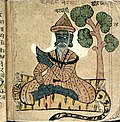Semantics
Semantics is the study of meaning. Meaning in this case refers to the relation between signifiers and what they stand for. Signifiers are words, signs and symbols.
The word semantics was first used by a French man named Michel Bréal. He studied the way that language was put together, how language changed as time passed, and the connections in languages.[1] Semantics can include simple or very complicated ideas. In everyday speech, it means a problem with understanding language that can confuse because of the words or their connotation (another idea created by a word that is not in its definition). This problem of understanding has been studied for a long time, especially in the field of formal semantics, where people explain the connection between words and their meanings in a clear way.
In linguistics (the study of language), semantics is the study of the attempts to understand signs or symbols used in agents (the words that cause an action) or communities in different situations.[2] Other items of language that are said to have meaning are sounds, facial expressions, body language, and proxemics, which is the use of personal space. Each of these topics connects to many ways of studying. In writing, things like the way paragraphs are written and the use of punctuation show meaning. Other types of language create other meanings.[2]
Formal semantics is sometimes similar to many other areas of language study. Some of these are lexicology (study of words), syntax (ordering of words), pragmatics (the study of language in different situations), and etymology (the history of words). Semantics is also a well-defined field on its own.
Semantics Media
The distinction between sense and reference was first introduced by the philosopher Gottlob Frege.[3]
Parse trees, like the constituency-based parse tree, show how expressions are combined to form sentences.
Cognitive semantics is interested in the conceptual structures underlying language, which can be articulated through the contrast between profile and base. For instance, the term hypotenuse profiles a straight line against the background of a right-angled triangle.
Ideational theories identify meaning with the mental states of language users.
Bhartṛhari developed and compared various semantic theories of the meaning of words.
One of Peter Abelard's innovations was his focus on the meaning of full sentences rather than the meaning of individual words.
References
- ↑ Chambers Biographical Dictionary, 5e.1990, p.202
- ↑ 2.0 2.1 Carnap, Rudolf; Frank, Philipp; Joergensen, Joergen; Morris, Charles W.; Neurath, Otto; Rougier, Louis (1937-10-29). "International Encyclopedia of Unified Science". Science. 86 (2235): 400–401. doi:10.1126/science.86.2235.400. ISSN 0036-8075. PMID 17832642.
- ↑ Zalta 2022, § 1. Frege’s Life and Influences, § 3. Frege’s Philosophy of Language.









